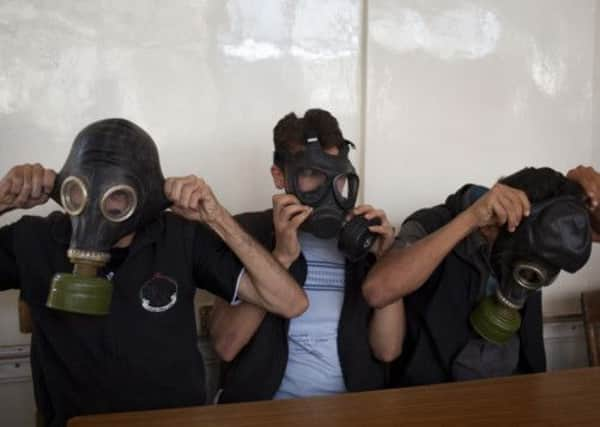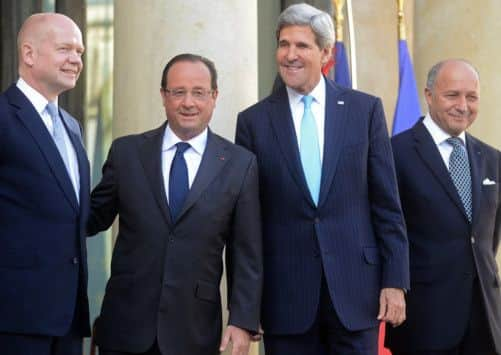Syria sarin gas attack a ‘war crime’ says UN


Weapons inspectors confirmed “unequivocally and objectively” that missiles containing the gas were deployed during the attack on 21 August, which killed an estimated 1,400 people.
And experts said that weather conditions at the time would have ensured the maximum number of people would have been killed or injured.
Advertisement
Hide AdAdvertisement
Hide AdAs expected, the report does not identify who launched the attack in the rebel-held Damascus suburb of Ghouta.


Western powers have claimed Syrian President Bashar al-Assad’s military committed the atrocity. Russia and Syria allege the rebels are responsible.
UN Secretary-General Ban Ki-moon said: “This is a war crime. The international community has a responsibility to hold the perpetrators accountable and to ensure that chemical weapons never re-emerge as an instrument of warfare.”
The United States, France and Britain warned Mr Assad on Monday there would be consequences if he fails to stick to a deal under which Syria must give up its chemical weapons. But Russia, which negotiated the offer with the US, cautioned against imposing tough penalties on the Syrian leader, who is Moscow’s close ally.
In Syria, fighting was reported on several fronts, and Turkey said its warplanes shot down a Syrian helicopter after it violated Turkish airspace.
The new investigation report, by chief UN investigator Ake Sellstrom, said: “On the basis of the evidence obtained during the investigation of the Ghouta incident, the conclusion is chemical weapons have been used in the ongoing conflict between the parties in the Syrian Arab Republic – also against civilians, including children, on a relatively large scale.
“In particular, the environmental, chemical and medical samples we have collected provide clear and convincing evidence that surface-to-surface rockets containing the nerve agent sarin were used.”
Temperatures were falling between 2am and 5am, it said, which meant that air was not moving upwards but toward the ground, meaning the gas would have maximum impact.
Advertisement
Hide AdAdvertisement
Hide Ad“Chemical weapons use in such meteorological conditions maximises their potential impact as the heavy gas can stay close to the ground and penetrate into lower levels of buildings and constructions where many people were seeking shelter,” it said.
Several weeks ago, US Secretary of State John Kerry announced that sarin had been used in the chemical attack on the Ghouta region. Around 1,400 people are said to have been killed, including more than 400 children, in last month’s attack.
Inspectors said they had managed to gather significant amounts of evidence despite obstacles including working around a ceasefire which lasted for just five hours per day.
They wrote: “In spite of the imposed time constraints, and repeated threats of harm, including an actual attack on the convoy by an unidentified sniper on 26 August, the mission was nonetheless able to gather a considerable amount of information and to collect the necessary amount of samples.”
Inspectors interviewed dozens of survivors and those who witnessed the aftermath of the attack, including emergency service personnel. It said: “Several of the ‘first responders’ also became ill, with one describing the onset of blurred vision, generalised weakness, a sensation of impending doom, followed by fainting.”
It revealed nine nurses and seven doctors were interviewed during the mission. Most had travelled to the scene of the attack from their homes and arrived to find “a large number of ill or deceased persons lying in the streets without external signs of injury”.
Inspectors studied the spent missile shells which delivered the deadly gas and noted that there was Cyrillic script written on the munitions, suggesting it had been supplied by Russia or another Russian-speaking state.
Some Western diplomats have privately said that information about the type of weapons and other details Mr Sellstrom might possess could hint at government responsibility for the attack, though rebels have seized all kinds of weapons from military depots across the country in the two-year civil war.
Advertisement
Hide AdAdvertisement
Hide AdMr Ban yesterday told the Security Council: “The United Nations mission has now confirmed, unequivocally and objectively, that chemical weapons have been used in Syria.”
Eliot Higgins, a Syrian war blogger who has previously made an accurate identification of the munitions used in the attack, said yesterday that in hundreds of hours of footage of Syria rebel weaponry, he had never seen armaments capable of firing such munitions.
Mr Ban told the council yesterday that 85 per cent of the blood samples taken by investigators tested positive for sarin, while almost all the biomedical samples taken tested positive for exposure to sarin.
The UN confirmation of the use of sarin gas comes as France, Britain and the US agreed at three-way Paris talks yesterday to seek a “strong and robust” UN resolution that sets precise and binding deadlines on removal of chemical weapons.
Those talks followed a weekend deal on Syria’s chemical weapons reached by the US and Russia that could avert US military action.
Mr Ban urged the Security Council consider ways to ensure enforcement and compliance with the US-Russia plan.
“I agree there should be consequences for non-compliance. Any use of chemical weapons by anyone, anywhere, is a crime,” he said.
Opposition voices have, however, said the chemical weapons deal with Syria effectively gives Mr Assad permission to carry on with his conventional war, in which more than 100,000 people have died, according to UN figures.